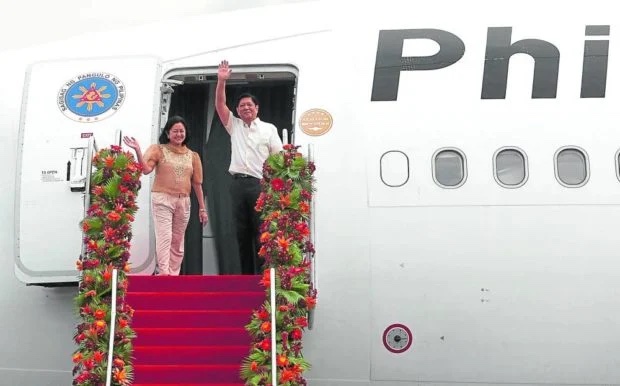
RANGE OF ISSUES President Ferdinand “Bongbong” Marcos Jr. and first lady Liza Araneta-Marcos board the plane to Beijing on Tuesday afternoon for his three-day state visit to China. (Photo by MARIANNE BERMUDEZ / Philippine Daily Inquirer)
BEIJING — How does a President make a state visit to China while it is struggling with a surge in COVID-19 cases? Well, very carefully.
The Philippine and Chinese governments made sure President Ferdinand “Bongbong” Marcos Jr.’s trip to Beijing this week would be very safe for both sides before and after the visit by requiring constant tests for COVID-19 on members of the Filipino delegation and restricting most of their movements to the hotel where they were staying.
Marcos’ seventh overseas trip as President, which wrapped up on Thursday, was unlike any of the previous six. For one, he did not meet with members of the local Filipino community in the Chinese capital.
“They are somehow disappointed because they wanted to be a part of this visit,” Philippine Ambassador to China Jaime Florcruz told reporters on Wednesday. “But we have a special situation. They understand that the trip was short and there were many protocols to be followed.”
‘Starting to normalize’
China stopped publishing COVID-19 data in late December as infections surged with an estimated 200 million reportedly infected in just 20 days last month.
But Florcruz believed the number of COVID-19 cases in China had already peaked.
“I think it’s under control because I noticed the traffic last night from the airport, there were a lot of cars. I think the situation is starting to normalize,” he said.
Marcos and his delegation, which included first lady Liza Araneta-Marcos, former President Gloria Macapagal-Arroyo and around 200 officials, staff, businessmen and journalists, were placed inside a “bubble”—The St. Regis Hotel in Beijing, which received no other outside guests during the January 3-5 visit.
Whenever members of the party leave the hotel, most of the time they were the VIPs and officials meeting their Chinese counterparts, they were required to get a swab test.
In previous overseas trips, the President’s hotel accommodation was always separate from most of the others in his delegation for privacy purposes.
The delegation was initially required to have two negative reverse transcription polymerase chain reaction (RT-PCR) tests taken within a 48-hour period before boarding the flight to Beijing.
Mask requirement
But on New Year’s Eve, the Chinese Embassy in Manila said one was enough but should be taken within 24 hours or less before the flight to Beijing—a similar requirement in all of the President’s other foreign trips.
Several minutes prior to landing in Beijing on Tuesday, the presidential staff distributed N95 masks, supposedly more protective against COVID-19 than other masks, to all passengers on Philippine Airlines Flight PR001. It was a requirement by China, according to one of the staff.
Marcos had to take another RT-PCR test for a series of meetings the next day, including one with Chinese President Xi Jinping.
To limit the risk of spreading any infection despite negative COVID-19 test results, only television cameramen were allowed to cover most of the President’s engagements.
Predeparture test
On Wednesday night, prior to their departure for Manila the next day, the delegation took another RT-PCR test. It was a Malacañang requirement this time. Everyone joining the PR001 flight back to the Philippines must be negative for COVID-19.
Such a test was not required before flying back home on previous presidential trips. Fortunately, the whole delegation tested negative.
Anyone who would have tested positive would be left behind and quarantined. They must test negative before flying back home.
Everyone on the flight home had to take an antigen test on arrival in Manila. No one tested positive.
Several countries have already mandated testing of travelers from China due to the unprecedentedly high infection rates and a lack of transparency in Chinese COVID-19 data while the Philippines has not imposed any restrictions so far.